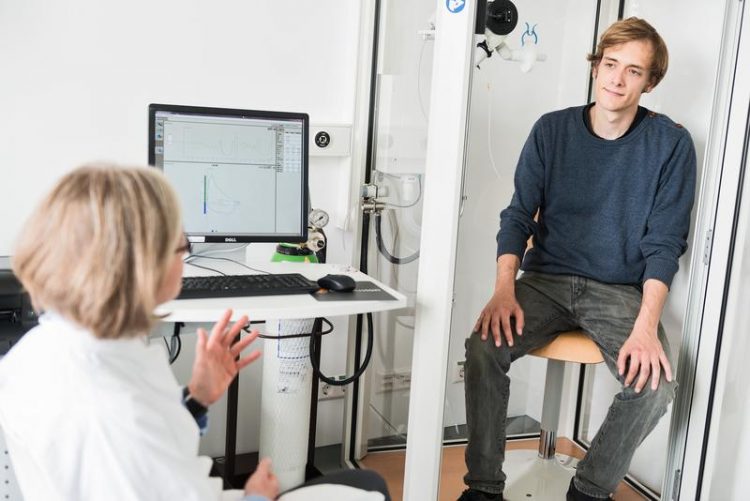Fraunhofer ITEM: Successful testing of new drug for allergic asthma

Body plethysmography at the Fraunhofer ITEM: Inhaled treatment with the new drug “SB010”, developed by sterna biologicals, significantly improved lung function in patients with asthma.
Asthma is a highly prevalent airway disease, affecting an estimated 300 million people worldwide. Asthmatics suffer not only from the disease itself, but also from its wide-ranging consequences. The therapeutic options for severe asthma to date are little satisfactory and require a new therapeutic principle. This is what sterna biologicals has developed with the new drug “SB010”.
It is based on inhibiting the transcription factor GATA-3 by a so-called DNAzyme – a synthetic DNA molecule with enzymatic action for inhaled administration. It binds to the transcription factor that triggers the inflammatory response and thus the typical asthma symptoms, inactivating it by enzymatic cleavage.
The Fraunhofer ITEM has accompanied development of this first-in-class antagonist with its expertise, from scientific advice and the required toxicity tests (in cooperation with Nycomed GmbH) to clinical trials of phases Ib and IIa. The latter, i.e. the proof-of-concept study, was conducted as a multi-center study in seven German centers under the scientific direction of Professor Norbert Krug, Fraunhofer ITEM Medical Director.
In the randomized, double-blind, parallel-group, multi-center trial, efficacy of the new therapeutic agent was tested. Treatment with “SB010” over 28 days significantly improved lung function after specific allergen challenge as compared to placebo. “SB010” furthermore proved to be safe and well tolerated. The results of this study were presented during this year’s International Conference of the American Thoracic Society in Denver, USA.
“Recent research indicates that approximately 50 percent of all asthmatics suffer from allergic asthma. This type of asthma is Th2-driven across all levels of disease severity. Therefore, developing novel therapeutics specifically for this group of patients holds great promise, in particular of drugs for inhaled delivery. Further clinical trials with ‘SB010’ in a larger cohort of asthmatics are thus warranted,” explains Krug.
Contact
Fraunhofer ITEM
Prof. Dr. Norbert Krug; +49 511 5350-8100
norbert.krug@item.fraunhofer.de
Press contact
Fraunhofer ITEM
Dr. Cathrin Nastevska; +49 511 5350-225
cathrin.nastevska@item.fraunhofer.de
The text of this press release including an image for download can be found on our homepage at http://www.item.fraunhofer.de/en/press-media/latest-news/pm_sternaSB010.html
http://www.item.fraunhofer.de/en/press-media/latest-news/pm_sternaSB010.html
Media Contact
All latest news from the category: Life Sciences and Chemistry
Articles and reports from the Life Sciences and chemistry area deal with applied and basic research into modern biology, chemistry and human medicine.
Valuable information can be found on a range of life sciences fields including bacteriology, biochemistry, bionics, bioinformatics, biophysics, biotechnology, genetics, geobotany, human biology, marine biology, microbiology, molecular biology, cellular biology, zoology, bioinorganic chemistry, microchemistry and environmental chemistry.
Newest articles

Sea slugs inspire highly stretchable biomedical sensor
USC Viterbi School of Engineering researcher Hangbo Zhao presents findings on highly stretchable and customizable microneedles for application in fields including neuroscience, tissue engineering, and wearable bioelectronics. The revolution in…

Twisting and binding matter waves with photons in a cavity
Precisely measuring the energy states of individual atoms has been a historical challenge for physicists due to atomic recoil. When an atom interacts with a photon, the atom “recoils” in…

Nanotubes, nanoparticles, and antibodies detect tiny amounts of fentanyl
New sensor is six orders of magnitude more sensitive than the next best thing. A research team at Pitt led by Alexander Star, a chemistry professor in the Kenneth P. Dietrich…





















